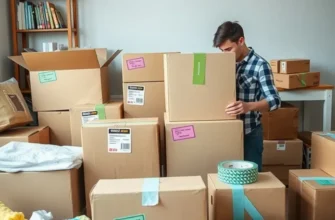Navigating the rental market in the U.S. can feel like trying to figure out a Rubik’s cube while blindfolded—complicated and slightly disorienting. For young adults, first-time renters, and families moving from overseas, the process can feel even more daunting. From understanding lease agreements to knowing what to ask during viewings, there’s a lot to absorb. But panic not! We’ve got you covered with essential tips and tricks. Whether you’re a couple searching for a cozy apartment or a family looking for a spacious home, this guide will help you tackle the rental maze with confidence and maybe even a laugh or two. So, grab your notebook—or your digital device—and let’s dive into the world of renting, where the only drama you need is the one you save for reality TV!
Understanding the U.S. Rental Market

Navigating the U.S. rental market can be challenging, but understanding its dynamics will make it more manageable. Begin with thorough neighborhood research. Prioritize factors that are important to you: safety, access to public transportation, and proximity to work or school. Online tools offer valuable data, including crime rates and school ratings. To explore neighborhoods, drive or walk around the area at different times of the day. Observe the surrounding facilities and talk to residents to gather firsthand insights.
Establishing a realistic price range is crucial. Rental prices vary significantly across states and even within cities. Review local rental listings to get a sense of the going rates for different types of properties. Don’t forget to factor in additional costs like utilities, which can add up quickly. Consider reading this guide on budgeting for utilities to plan effectively.
Familiarize yourself with U.S.-specific rental terminology. The term “lease” refers to a binding rental contract, often lasting for a year. “Security deposit” is the money paid upfront to cover potential damages, typically equivalent to one month’s rent. “First month’s rent,” along with the deposit, is usually due before moving in. “Renter’s insurance” is an optional but often recommended policy to protect your personal belongings.
Online platforms are excellent for comparing rental options, but remember to verify listings by contacting landlords directly. Err on the side of caution to avoid scams—never send money without verifying the property. Local resources like bulletin boards and community groups can also provide rental leads.
When viewing a property, inspect everything carefully. Check for maintenance issues such as leaks, faulty electrical systems, and mold. Don’t hesitate to ask about the property’s history, including prior tenants’ experiences.
Negotiation might seem daunting, but it’s a standard practice in the U.S. rental market. Once you find a property you like, discuss the terms before signing the lease. You might negotiate the rental price, lease duration, or inclusion of certain utilities. Landlords may be willing to offer a discount for a longer lease commitment.
Finally, carefully review your lease agreement. Understanding your commitments and rights as a tenant is vital. Pay attention to clauses about rent increases, repair responsibilities, and termination conditions. If in doubt, consult a real estate attorney to avoid future disputes.
By comprehending the U.S. rental market, young adults, first-time renters, and families can make informed decisions. A proactive approach in researching and negotiating will make the rental experience smoother.
The Ins and Outs of Lease Agreements

Ah, lease agreements—those delightful documents full of legal jargon that most people skim over yet sign with reckless abandon. Whether you’re a young adult, a first-time renter, or part of a bustling family, reading and understanding your lease can save you from future headaches. You know, the kind that no amount of sugar or caffeine can fix.
Lease agreements are essentially the rulebooks of renting, filled with terms that outline what you can and can’t do within your cozy new habitat. Let’s dive in, starting with a favorite: security deposits. Think of these more like an anti-party fund. Landlords require these to cover any unforeseen damage or unpaid rent, so this is not your “move-in purchase spree” money. Always check the lease for the condition requirements to get it back and any timelines specified for its return.
Now, control your excitement as we move to maintenance obligations. Many first-time renters misunderstand what they’re responsible for. Generally, landlords handle major repairs, like a break in the HVAC system, but tenants need to keep things tidy. Overflowed your bathroom because you thought Captain Ahab would appreciate your fishing skills? That one’s on you.
And now, a riddle: what’s temporarily invisible but always there? Answer: lease terms. Pay special attention to specifics around lease duration and rent increase clauses. Imagine your rent is like a gremlin; left unchecked, it might just sprout wings. Watch for how often and how much the rent can climb during or after the lease.
Speaking of warm welcomes, beware of those friendly sounding lease restrictions. Whether it’s pet policies or guest limitations, make sure these align with your lifestyle. You don’t want a surprise eviction notice because your Great Dane (who is ironically named “Tiny”) is considered contraband. For more specific guidance on family apartment lease tips, check out this article for some handy insights.
Lastly, know your rights under local housing laws. Understanding renter rights can be as tough as pronouncing “Worcestershire,” but it’s equally important. If your landlord threatens eviction over a rent that’s one day late, knowing your legal protections can help you stand your ground… or dramatically storm away while quoting legalese.
In conclusion, a lease agreement is not a document to fear but a map of your new quest in the renting world. With knowledge in one hand and humor in the other, navigate it wisely, and your castle (or one-bedroom apartment) will always feel like your domain.
Final words
Finding the right rental can be a journey, especially for international renters stepping into the U.S. landscape. With the knowledge gained from understanding the rental market and lease agreements, you’ll not only find a place to hang your hat but do so with confidence and a smile. Remember, every great adventure starts with a single step—whether it’s moving into your new home or embracing your new journey in the U.S. Happy renting!









